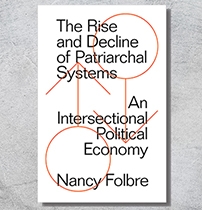 What can we learn from the complex trajectories of patriarchal power?
What can we learn from the complex trajectories of patriarchal power?
Neither mainstream nor heterodox economics does a very good job of explaining inequalities based on gender, age, and sexuality, and feminist economics has fallen short in its analysis of other dimensions of inequality. This book offers a new synthesis, describing social systems comprised of many intersecting, overlapping structures of collective power that often put both individuals and groups into contradictory positions—winners in some respects, losers in others.
Broader definitions of concepts such as “production,” “surplus,” and “exploitation” help explain coercive bargains in which some groups are able to consolidate both power and privilege. This perspective informs a reinterpretation of many historical dramas, including the origins of patriarchal power, the emergence of capitalist institutions, the rise of the welfare state, and the intensification of economic penalties for care provision. It helps explain how patriarchal influence has morphed into new, weaker, but persistent forms. It also points to the need for a general theory of economic justice that could strengthen broad coalitions for progressive social change.



